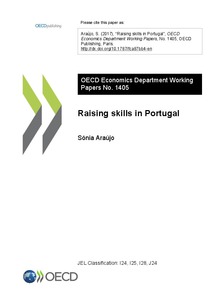Raising skills in Portugal
"Despite significant progress made, improving skills remains one of Portugal’s key challenges for raising growth, living standards and well-being. Upskilling the adult population remains a priority and lifelong learning activities should focus more on the low skilled. While active labour market...
| Main Author: | |
|---|---|
| Institution: | ETUI-European Trade Union Institute |
| Format: | TEXT |
| Language: | English |
| Published: |
Paris
2017
OECD |
| Subjects: | |
| Online Access: | https://www.labourline.org/KENTIKA-19286468124910046409-Raising-skills-in-Portugal.htm |
| _version_ | 1771659896943542273 |
|---|---|
| author | Araújo, Sonja |
| author_facet | Araújo, Sonja |
| collection | Library items |
| description | "Despite significant progress made, improving skills remains one of Portugal’s key challenges for raising growth, living standards and well-being. Upskilling the adult population remains a priority and lifelong learning activities should focus more on the low skilled. While active labour market policies have increased their training content in recent years, spending per unemployed is still low. A systematic monitoring of the different programmes would allow concentrating resources on the policies that are more effective in raising skills and employment prospects. In the education system, successive increases in compulsory education have not eliminated early school leaving, and a significant share of youth is left without completed secondary education, thus facing poor labour market prospects and a risk of falling into poverty. Another challenge for the education system is to reduce the link between learning outcomes and socio-economic backgrounds. This could be achieved by providing earlier and individualised support to students at risk of falling behind, strengthening teachers and principals training and exposure to best practices, and creating incentives to attract the more experienced teachers to disadvantaged schools. Vocational education and training (VET) has received less attention than general education until recent years and has suffered from fragmented management. This has curtailed the employment prospects of youth not wishing to pursue tertiary education. Establishing a single VET system and reinforcing work-based learning in companies would address this issue. Tertiary education has expanded considerably over recent years but could have a stronger focus on labour market needs, including by developing tertiary technical education. Enhanced support for business research activities could be coupled with strengthening management skills and the ties between businesses and researchers, for example by creating incentives for academics to cooperate with the private sector." |
| format | TEXT |
| geographic | Portugal |
| id | 19286468124910046409_0681d2d3a3544ea69d44697b84b7d75c |
| institution | ETUI-European Trade Union Institute |
| is_hierarchy_id | 19286468124910046409_0681d2d3a3544ea69d44697b84b7d75c |
| is_hierarchy_title | Raising skills in Portugal |
| language | English |
| physical | 44 p. Digital |
| publishDate | 2017 |
| publisher | Paris OECD |
| spellingShingle | Araújo, Sonja continuing vocational training lifelong learning skill labour market policy Raising skills in Portugal |
| thumbnail | https://www.labourline.org/Image_prev.jpg?Archive=128581394676 |
| title | Raising skills in Portugal |
| topic | continuing vocational training lifelong learning skill labour market policy |
| url | https://www.labourline.org/KENTIKA-19286468124910046409-Raising-skills-in-Portugal.htm |

